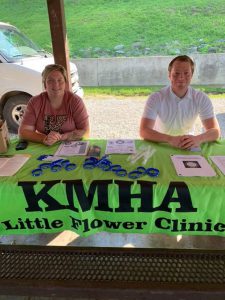Eric Lakomek ’21 — This summer I have had the pleasure to participate in an immersive learning experience funded by the Wabash Global Health Initiative with Frontier Nursing University and the Little Flower Clinic. I was given the opportunity to experience rural health firsthand at a homeless clinic in the community of Perry County, Kentucky.

Before, I begin to dive into what I was able to observe and complete this summer, I think that it is important to discuss a little bit of background on the area I worked and lived. The coal industry used to be the largest employer of the residents in the county. In 2012, when the mines started to close, thousands of individuals lost their jobs and their livelihood. This led to a sharp increase in the homeless population due to the fact that there just wasn’t anywhere else to work and make a decent living. From the grueling work in the mines, many individuals suffered from chronic pain and turned to pain prescriptions to cope. Eventually, this area became the posterchild for the opioid crisis. Perry County was recently ranked 4thin the United States for pain prescriptions with enough pills prescribed to supply each person in the county with 175 pills per year.
Working in the homeless clinic, I was able to see the most vulnerable population and how this directly affected them. I was able to learn about the many treatment methods used to combat the crisis. In addition, I was able to learn the day to day operations of a grant-funded primary care clinic. I worked with two amazing nurse practitioners, Vera and Allyson, who taught me so much about different conditions and how a practitioner must approach treating an individual holistically, due to limited resources available.
Most of my time was spent doing outreach with the case workers at the clinic. I accompanied them to farmers markets, community events, and also on home visits. It was extremely interesting to observe the approach of bringing healthcare into the homes and lives of others, rather than have them come into the clinic. I believe that this makes many of the goals for the patient much more attainable because they feel more comfortable in their home setting. There is a large distrust of medical providers in the area so bringing healthcare to the people seemed to open many more people up. This, in my opinion, helped reduce many adverse health outcomes because barriers could easily be identified.
While I was seeing patients and doing outreach, I also completed a community needs assessment and project based off of the results I received. As identified in the community needs assessment, heart disease is the number one killer in Perry County. Heart disease has many complications, but hypertension and diabetes are two leading root causes of this issue. Diabetes prevalence in Perry County stands at a staggering 16%. This may be in direct correlation with adult obesity rates of 40%. Both of these rates are significantly higher in this community compared to Kentucky and the United States.

Diabetes and Hypertension are two of the most common chronic conditions that are prevalent in the Little Flower Clinic. Many patients that come into Little Flower are living on low income and cannot afford to purchase the necessary items needed to manage their condition. Therefore, when they are diagnosed with having hypertension or diabetes, the only materials the patient receives are medications and glucometers through their insurance. If a patient presents without insurance or cannot afford to pay, then many aspects of managing their conditions are not met. This led me to provide diabetes/hypertension care kits. Patients were able to receive blood pressure monitors, weight scales, wristwatch pedometers, and pill cases. These items allowed the clinic to distribute necessary health management equipment to patients in need so that they can help reduce adverse health outcomes. In addition to the diabetes/hypertension care kits, I provided education to bring A1C levels, cholesterol levels, and systolic/diastolic blood pressure down. Recipe booklets and brochures were created to educate patients on affordable, healthy recipes to make for themselves.
After reflecting on my experience this summer, I can truly say that I have changed in so many different ways. I have become much more appreciative of the things that I have in my life. The cultural experience in Appalachia has opened up my eyes to and taught me so much about who I am as a person and future physician. I will never forget my experience this summer at the Little Flower Clinic and I will continue to recall upon the information I acquired to use to improve the lives of others in the future.